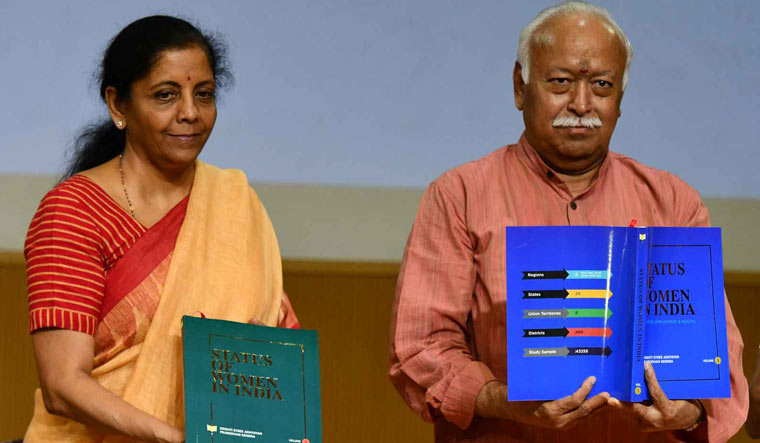Men cannot decide the development path for women, but the reverse may be true, said RSS chief Mohan Bhagwat.
At a programme to launch the study 'The status of Women in India,' conducted by an RSS-affiliated organisation, Drishti, Bhagwat said men should not harbour overconfidence that they can decide how woman can be empowered, and added that the decision should be left to women.
The Sangh, in its last coordination meeting held in Pushkar, Rajasthan, decided to focus on women, especially those belonging to tribal population. The study was reviewed at the meeting and its findings led to the RSS asking its frontal organisations to work for upliftment of women. Many projects have already been initiated in this regard.
Bhagwat said he is often asked about the role of women in Sangh, and added that the work done by women is for all to see. He noted that even for this particular study, the work was done by women while men only “cheered” for them.
Finance Minister Nirmala Sitharaman, who attended the event, said, “Based on Western concepts, we are told women are in a disadvantageous position. This study showed that they are empowered. This doesn't mean women don't have disadvantages."
Sitharaman said women do not want token participation. She further said while women may require legal provisions to have opportunities, it is also important that they come forward. “We should come out of comfort zones to give proof (of competence)," she said. There are three aspects to empowerment: access, opportunity, and women speaking out, the minister added.
also read
- India fastest growing economy during last 3 financial years: Nirmala Sitharaman
- 'I don't have money to contest Lok Sabha elections': Nirmala Sitharaman
- Change in demeanour should not be prompted by ED raids: Bhagwat
- Nirmala Sitharaman confident of India Inc aligning to country's developmental goals
- Sitharaman meets with top execs of 50 fintech companies; asks them to strictly comply with norms
The study found that the literacy rate among women has increased since the last census of 2011, where it was recorded at 64 per cent. The study claims that it stands at 79.63 per cent now. Illiteracy was highest among tribal women, followed by those belonging to the scheduled castes.
The female unemployment rate was the highest in the general category and among the scheduled tribe women. The tribal women also faced highest instance of sexual harassment, the study revealed.
The study was conducted across 29 states, five union territories, and 465 districts, between 2017-18. As many as 74,095 women were interviewed.
The survey revealed that nearly half the women have meals twice a day, and 3.73 percent once a day.
In case of health findings, nearly 40 percent of the women were hospitalised in the last two years. "The percentage is much more in case of women from spiritual field," the study said. However, those belonging to spiritual field are happier than others, according to the study.
The study conducted by Dristi also claimed that married women recorded higher instance of happiness than those in live-in relationships.
The study also found out that family income had no affect on the level of happiness and well-being. "Above 90 percent of respondents who are not having family and no income possess very high level of happiness and well-being, and lowest percentage is seen in women having family income below Rs 10,000."
Manisha Kotekar, the project director for the study, said, "The study also found that 90.62 per cent had an Aadhaar card showing its reach, while 79 per cent had bank accounts, and 84 per cent had voter cards. Aadhaar cards were available to less than 50 per cent of the women in the Northeast region."
Bhagwat also called on men to read the report and act up on it.



